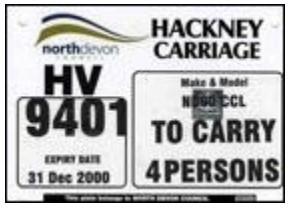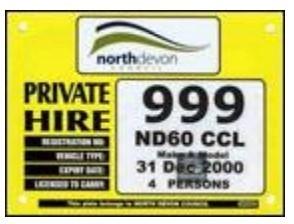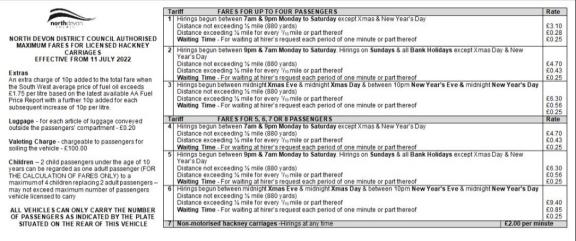Are you taxi aware?
Make sure you only ever use a licensed vehicle and know the difference between a Hackney carriage and a private hire vehicle:
- pre-book your journey wherever possible - especially if you are travelling alone, always use a licensed hackney carriage proprietor or a licensed private hire operator
- let a third party know the details of your journey
- wait for your booked vehicle to arrive - never get into another vehicle if it arrives in advance of your booked vehicle. Always confirm your booking with the driver when he/she arrives and make a note of the licence number
- arrange to be picked up from a safe meeting point – request what the fare is likely to be
- know where the local taxi ranks are – if available choose one which is staffed by taxi marshals
- always check a driver's ID badge - a driver should always wear this or have it clearly displayed, which confirms they are licensed
- ride with friends where possible - sharing a vehicle is a great idea and always sit in the back seats
- only enter a vehicle when you are sure - if you have any doubts, don’t get in and order another vehicle
- check you are paying the right fare – ensure a hackney carriage meter is always switched on
The difference between a Hackney carriage and private hire vehicle
Hackney carriages (taxis) can be booked in advance from an office, hailed from the street when the 'For Hire' light is on or hired from a taxi rank.
When the 'For Hire' light is on, drivers can't refuse a fare without a reasonable excuse.
A licensed taxi will have a top light and can be recognised by a white plate on the back of the vehicle with the council's logo and a four-figure number with an 'HV' prefix.
An example of a North Devon Council hackney plate:

Private hire vehicles must be booked in advance from an office and can't pick you up from taxi ranks or be hailed from the street.
They can be recognised by a yellow plate on the back of the vehicle with the council's logo and a three-figure number with a 'PV' prefix.
An example of a North Devon Council private hire plate:

Fares
All taxis must have a meter fitted within the vehicle, which calculates the fare for a journey.
The council has set the maximum fares that can be charged for taxi journeys and these include any VAT. However, it is up to the individual taxi owner whether or not they decide to charge the maximum fare. Information of the rates they charge should be displayed in the vehicle for you to clearly see.
An example tariff card:

Maximum fares vary depending on what time and day you travel. There are also different maximum fares for how many other passengers you are travelling with. For example, there are two different rates - one for up to four passengers and another for five to eight passengers.
Taxi meters are required to be switched on when you are seated at the start of your journey, and then if a driver wishes to make any discount, he can do so at the end of a journey.
You should not be charged more than the price displayed on the meter for the journey and any waiting time. For journeys that end outside the district, taxi drivers may use the meter or agree a fare with the passenger before the journey starts.
A taxi driver can only charge a fare that is calculated from the point where you start your journey.
Private hire fares are usually charged by a set amount per mile or a negotiated price. North Devon Council has no authority over these charges.
Your rights as a passenger
When you have hired a taxi or pre-booked a private hire vehicle you have certain rights. These are:
- the driver must only charge the fare that is being shown on the meter unless the fare is agreed before the journey starts
- the driver must comply with any instructions you give, such as the route
- the driver must take you to your destination by the shortest route possible
- the driver must not allow other passengers to share the vehicle without your agreement
- when requested, the driver should assist in loading and unloading luggage and should also carry it to and from a house, station or place where you are picked up or set down
The Taxis and Private Hire Vehicles (Disabled Persons) Act 2022 amends the Equality Act 2010 so that disabled people have specific rights and protections. Taxi and private hire vehicle drivers have specific duties to carry and assist any disabled person without charging extra and are to carry assistance dogs without extra charge. Drivers of designated wheelchair accessible taxi or private hire vehicles are to carry a wheelchair user without charging extra, and any non-exempt driver must provide reasonable assistance to any wheelchair user. Furthermore, it is an offence for a private hire vehicle operator or driver to refuse a booking from a disabled person because that person is disabled.
Some drivers may have a physical condition or medical grounds which make it impossible or unreasonably difficult for them to provide the sort of physical assistance which the mobility assistance duties in the Equality Act 2010 require. North Devon Council may grant exemptions to applicable drivers specifically from prescribed “mobility assistance” duties in line with the Act.
Government guidance provides further information on the amended duties.
Lost property
At the end of a driver's shift, drivers must carry out a search of their taxi or private hire vehicle for property that may have been left.
If any property has been left in a taxi or private hire vehicle by a passenger, is found by or handed to the driver, the driver is expected to complete a found property form on the police website.
Most found property does not need to be taken to a police station, unless the items are:
- mobile phones, laptops, cameras - anything with an internal memory
- personal ID - such as a passport, driving licence, bank card, utility bills
- drugs
- significant amount of money
Those items that do not need to be taken to a police station should be kept by the driver for at least 28 days (providing arrangements have not been made for their collection).
How to make a complaint
It is an offence for a taxi driver to charge more than the maximum fare. If you believe that a taxi driver has overcharged you or unreasonably prolonged your journey in time or distance (other than legitimate reasons such as to avoid congestion or roadworks), please contact the council’s Licensing team. We will treat any such allegation seriously and robustly investigate any complaints made.
If you want to raise any other complaint about a North Devon Council licensed vehicle or driver, you may choose to take up your complaint with the driver directly.
Alternatively, make a note of the driver's name and badge number, vehicle plate number (which is shown on the back of the vehicle and in the windscreen) and vehicle registration number, and again, please contact the licensing team (you will need to log in or sign up to My Services to report).
